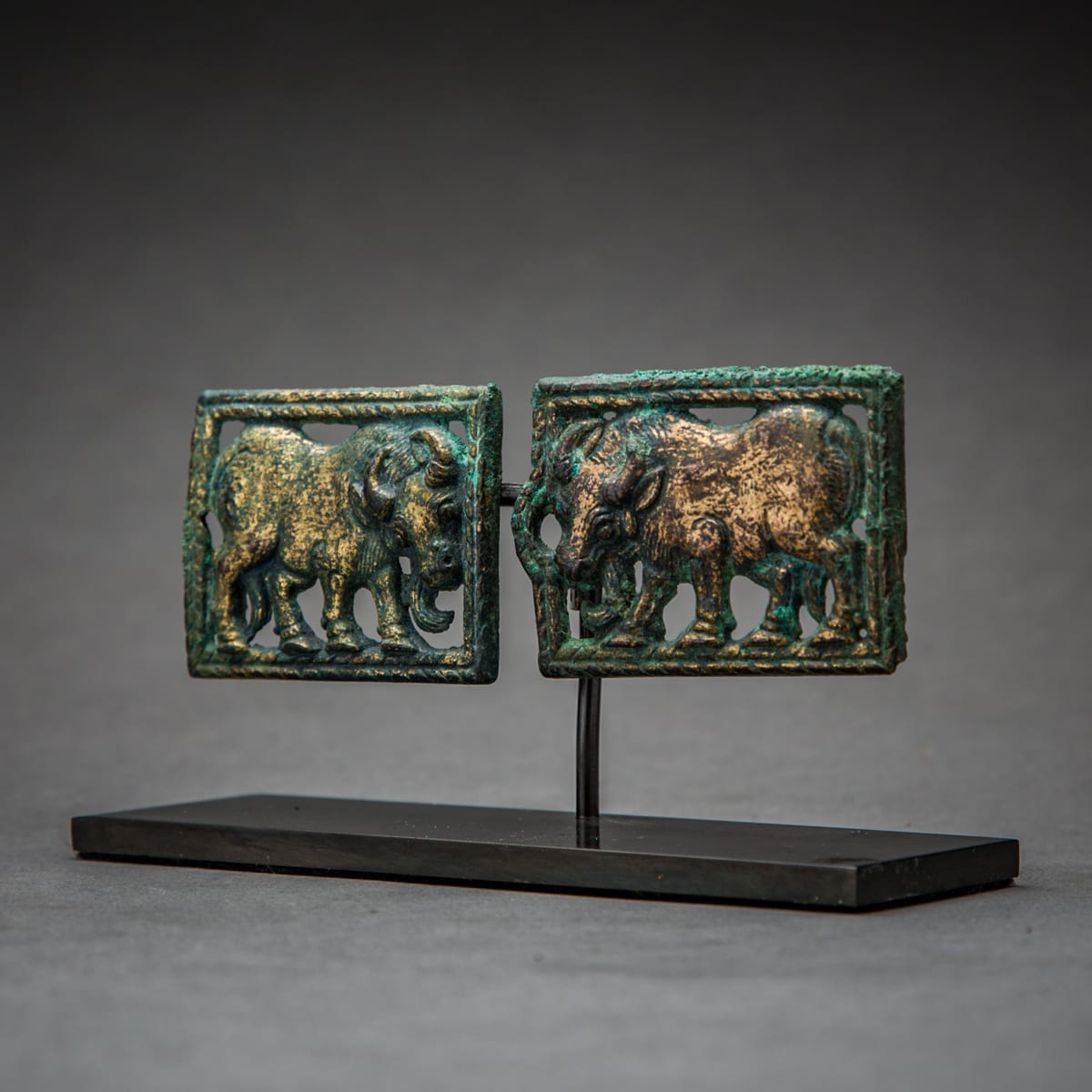A Pair of Ordos Bronze Belt Buckle Plaques, 300 BCE - 100 BCE
Gilt Bronze
4.3 x 5.4 cm
1 5/8 x 2 1/8 in
1 5/8 x 2 1/8 in
LO.1052
These plaques can be safely attributed to the Xiongnu people. Although the early history of the Xiongnu is still blurred, we know that by the 3rd century BC they already...
These plaques can be safely attributed to the Xiongnu people. Although the early history of the Xiongnu is still blurred, we know that by the 3rd century BC they already formed a vast steppe confederacy stretching throughout the Eastern Eurasian steppes. The artefacts most commonly associated with the Xiongnu are the belt buckles formed either by a pair of solid cast plaques or a pair of openwork plaques cast in mirror image, comparable to the ones here illustrated. In fact many single plaques, like this one, originally would have been produced in pairs.
Each plaque depicts in mirror image the profile of a standing ox. All four legs of the ox are shown, with its head in three-quarter view, and its tail curving between its hind legs. The modelled border of each plaque forms a herringbone pattern, embedded with malachite green corrosion on the front. Together the two plaques form one complete set. The wearer’s left hand plaque has a ring that projects sideways on the right as part of the fastening system and two small vertical loops on the reverse side opposite the ring. The other plaque also has two small vertical loops. The way in which the loops are made, confirms that each plaque was cast by the lost wax process. These artefacts were often produced by Han craftsmen, as most have been indeed found in Western Han tombs, suggesting that they were made for Chinese patrons with exotic taste or for the Xiongnu as a gift or a trade item.
Plaques like these are found in both northern China and Inner Mongolia and other examples appear in many collections worldwide. Yet it is very uncommon to have the complete buckle, as sets were often divided up for profit, dealers not understanding that these plaques function together. A plaque depicting a bovine image in the same kind of frame was also excavated from a tomb in Chengdu, Sichuan province, with coins dating the tomb to the late 3rd-2nd century BC. One other example was found in Tongxin xian Daodunzi, Ningxia province.
Reference:
E. Bunker, Ancient Bronzes of the Eastern Eurasian Steppes, A.M. Sackler Foundation, 1997: pl.218, p. 257. Tian and Guo eds. E’erduosishi qingtongqi, Beijing 1986. Hu Changyu, “Chengdu shuyang Xi Han muguomu” Kaogu yu wenwu 1983.2; pp.26-7. Duan Shu’an, Beifang Minzu, Beijing, 1995.
Each plaque depicts in mirror image the profile of a standing ox. All four legs of the ox are shown, with its head in three-quarter view, and its tail curving between its hind legs. The modelled border of each plaque forms a herringbone pattern, embedded with malachite green corrosion on the front. Together the two plaques form one complete set. The wearer’s left hand plaque has a ring that projects sideways on the right as part of the fastening system and two small vertical loops on the reverse side opposite the ring. The other plaque also has two small vertical loops. The way in which the loops are made, confirms that each plaque was cast by the lost wax process. These artefacts were often produced by Han craftsmen, as most have been indeed found in Western Han tombs, suggesting that they were made for Chinese patrons with exotic taste or for the Xiongnu as a gift or a trade item.
Plaques like these are found in both northern China and Inner Mongolia and other examples appear in many collections worldwide. Yet it is very uncommon to have the complete buckle, as sets were often divided up for profit, dealers not understanding that these plaques function together. A plaque depicting a bovine image in the same kind of frame was also excavated from a tomb in Chengdu, Sichuan province, with coins dating the tomb to the late 3rd-2nd century BC. One other example was found in Tongxin xian Daodunzi, Ningxia province.
Reference:
E. Bunker, Ancient Bronzes of the Eastern Eurasian Steppes, A.M. Sackler Foundation, 1997: pl.218, p. 257. Tian and Guo eds. E’erduosishi qingtongqi, Beijing 1986. Hu Changyu, “Chengdu shuyang Xi Han muguomu” Kaogu yu wenwu 1983.2; pp.26-7. Duan Shu’an, Beifang Minzu, Beijing, 1995.



